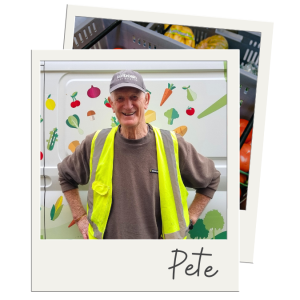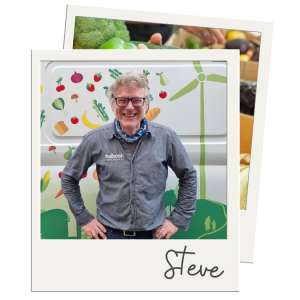Humans of Kaibosh – Pete & Steve
Meet the Humans of Kaibosh – stories from the amazing people who contribute to our collective mahi!
Tuesday’s A Team – six years of friendship and good mahi
– by Louise Hammersley.
Steve and Pete are Kaibosh’s longest serving Food Rescue Driver and Volunteer Support team. They both joined Kaibosh in 2017 just over a month apart, working together now for six years and counting, going all over Wellington City for the food rescue run. Come along for the ride and check out their story and video!

Pete
Role in Kaibosh: Volunteer Food Rescue Driver Support
Date started with Kaibosh: November 2017
Occupation: Retired Farmer
What they’re doing when they’re not at Kaibosh: Volunteering at Zealandia, going to the theatre, or going walking.

Steve
Role in Kaibosh: Food Rescue Driver
Date started with Kaibosh: August/September 2017
What they’re doing when they’re not at Kaibosh: Working at Maranui Café, Leather work
Every Tuesday morning at the central Wellington Kaibosh site, Pete dons a high vis vest and climbs into the Kaibosh van alongside his mate Steve. They head out on the roads, rain or shine, to visit local food businesses. The duo stride through the inwards goods entrances of supermarkets greeting people with big smiles and many by name, to collect crates of mostly decent surplus food that would otherwise go to waste or be sent off to feed animals.
The team form a dynamic duo – or in their own words ‘The A Team’ – and the Tuesday food run is filled with lots of banter. Although he has the route well mapped out in his head, Steve likes to tell stories as he drives, which often results in Pete silently pointing his finger towards a turn off as a gentle reminder that there’s an upcoming turn. However, Steve says he likes having a co-pilot, they enjoy working as a team as driver and navigator.
Once Steve and Pete have loaded up the van they continue on their busy route visiting a number of food businesses who partner with Kaibosh to donate quality surplus food which the food rescue charity distributes to the wider community. The duo are regularly stunned and grateful at the quality of food that is able to be rescued, which would have been headed for the bin. They bring all the rescued food back to the Kaibosh base to be sorted by a team of volunteers.
“The best part is the sense of doing good, sense of community within Kaibosh itself – generally helping people and cutting down on waste.”
Pete says the greatest number of banana boxes of food he and Steve have picked up in one day is 120. Just the two of them, in the one morning food rescue run. A usual day is 60-70 boxes.
“Still, it’s a good 700-800 kg of food that we’re getting – that’s great.” says Steve.
“And it’s better than going to the gym” – adds Pete – “throwing these boxes about!”
Pete and Steve work well together, with a well-oiled unspoken system that evolves only between two people who have worked together for a long time. Their routine of arriving in the inwards goods section, collecting the food and then loading it into the van is smooth enough that they could probably get a position as get-away drivers. They both know when to lead and when to go with the flow. To be friendly to everyone but to know when to stand up and say if something isn’t right.
Steve says it’s important for him that Kaibosh has a good reputation with the food businesses they rescue from. That they greet the workers, clean up after themselves and ask if there’s any other food that can be rescued that hasn’t been marked specifically for Kaibosh. They hope to spread the story about what Kaibosh does, share the positive impact, to motivate these businesses to have the same no waste mentality.
Motivated to help
Steve’s motivation comes from trying to reduce the exploitation of food and alleviating poverty. This is a passion and an area he’s worked in his whole life, which he says stemmed from growing up poor himself. He says he was really influenced by seeing the work his mother did with the IHS back in Scotland when he was a ‘wee fella’.
Beyond the role of driver, Steve says he loves to get as involved with Kaibosh as possible. He feels committed and wants to keep building the organisation.
“I’m a driver but I’m much more than that, I like to participate in all things of the building of Kaibosh.”
Sharing is in Steve’s nature. Whether it’s inviting people round for tea at his place, getting everyone to have a sample of his home cooked lunch, or trying to trade you his spare pair of cowboy boots for a carrot cake (true story) – Steve brings people together through openness and kindness.
“Generally, people volunteer or work for Kaibosh if you’ve got an understanding that you’re doing it for a reason, not just as a job but for a common motivation.”
For Pete, who had been a farmer his whole life, it wasn’t until he retired and moved to Wellington that he experienced living in a city. As a farmer, he found it quite distressing to see the amount of food waste in urban environments that on the farm was still considered perfectly good or would otherwise go to feeding pigs.
Pete’s motivation for both sustainability and giving back to the community drove him to sign up to volunteer at Kaibosh. He says that anyone can easily be in a situation where they aren’t well off, it’s down to good or bad luck. So, it’s important to give where you can.
“It’s something to give back to the community. Especially with Kaibosh, when we give kai… it’s just a case of we could have been needing it too if we’d been unluckier.”
Pete says Kaibosh has shown him that there’s a whole community of people out there helping others – and he now likes to think that he’s one of them. It’s refreshing realising how much good is being done.
Connecting with community
Halfway through the Tuesday route the pair stop for a coffee at Maranui Café. Steve works at the café on Sundays, as he likes to stay connected with young people. While they down a hot coffee people came over to say how much they love Kaibosh and value what they do for the community. While driving in the van someone shouts something similar while they wait at a stop sign. Steve says these compliments happen all the time – while they don’t seek them out, it’s nice to know that people think that they’re doing a good job.
Steve says that he finds Kaibosh such a good employer because it’s allowed him to be himself. He enjoys that he gets to work with all walks of life and that team members’ quirks are celebrated – everyone is allowed the space to be themselves. Steve lists the Kaibosh values of being courageous, smart and independent as being important for not only him but lots of people as well.
“I love how I’m able to have autonomy and I love doing good, I don’t like leaving having not done my best. I feel that I want to be much more of a collective and that’s what makes me most happy. I want to engage with people.”
Pete says it’s the common connection of wanting to help that has brought people together at Kaibosh, which has become a sort of echo chamber for passions and motivations for the common good.
“The best part is the sense of doing good, sense of community within Kaibosh itself – generally helping people and cutting down on waste.”
They both say that the experience at Kaibosh has helped them learn to work with other people. It’s the team and the shared motivations and community at the heart of Kaibosh, which makes it work.
At the core, Kaibosh is helping the community with kai. But, Steve says, it goes beyond that as they help lots of different people in other ways. This can include giving support to people who may feel abandoned or frustrated. Kaibosh can offer them community and support, whether that’s with gaining volunteering experience to help them re-enter the workforce or gaining a sense of belonging by connecting with people and being part of a collective of community groups.
“We offer so much more than just a little bit of food, we offer community and a sense of belonging.”
A day of good mahi
At the end of their Kaibosh Tuesday shift together, around 1 or 2pm, Pete and Steve hang up the high vis and park the EV van to be charged overnight. They head off, knowing that a morning of good mahi for Kaibosh has saved a lot of food from waste and is getting good kai on to the table for many people who really need it.
“Ehara taku toa i te toa takitahi, engari he toa takitini – Success is not the work of an individual, but the work of many”
About the author:
During spring 2023, we hosted Louise Hammersley for a student internship at Kaibosh. Louise interviewed some of our volunteers and staff in Pōneke, Petone and Paraparaumu. Come along for the ride as she shares their stories in our new blog series. Look out for the next story coming soon.
Keen to support Kaibosh? Find out how to donate, volunteer or give food.





